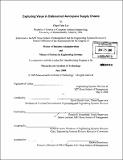Capturing value in outsourced aerospace supply chains
Author(s)
Lee, Chan Yuin
DownloadFull printable version (18.68Mb)
Other Contributors
Leaders for Manufacturing Program.
Advisor
David Simchi-Levi and Donald B. Rosenfield.
Terms of use
Metadata
Show full item recordAbstract
The aerospace industry is increasingly outsourcing and offshoring their supply chains in order to maintain profitability in the face of increasing competition and globalization. This strategy for value creation inevitably increases the inherent risks and complexity in the supply chain. This in turn makes capturing the value created extremely challenging as the organization, processes, relationships and operating models require change. Firms that do not focus on value capture risk failing to effectively unlock value and increase profitability despite having outsourced and offshored a significant portion of their value-add. This thesis introduces a framework that helps firms execute value capture in their global supply chains more effectively. The framework consists of four levers that directly and indirectly influence the ability to impact a firm's bottomline. These levers are: effective organizational structure to manage the supply chain, effective supplier management processes to avoid cost of failure, integrated supply chain and operational excellence to unlock value, and business continuity planning to protect value. This framework is analyzed in the context of Spirit Europe, which is a division of Spirit Aerosystems, Inc. as a case study to understand the specific challenges, practical realities and opportunities to applying this framework in industry. Spirit Europe has recently encountered various supply chain issues like poor supplier quality, high inventory holdings, material shortages and project cost overruns which have impacted their profitability. A series of analytical models and optimization methods is also introduced to specifically address the challenges and opportunities identified via the framework.
Description
Thesis (M.B.A.)--Massachusetts Institute of Technology, Sloan School of Management; and, (S.M.)--Massachusetts Institute of Technology, Engineering Systems Division; in conjunction with the Leaders for Manufacturing Program at MIT, 2008. Includes bibliographical references (p. 111-113).
Date issued
2008Department
Leaders for Manufacturing Program at MIT; Massachusetts Institute of Technology. Engineering Systems Division; Sloan School of ManagementPublisher
Massachusetts Institute of Technology
Keywords
Sloan School of Management., Engineering Systems Division., Leaders for Manufacturing Program.